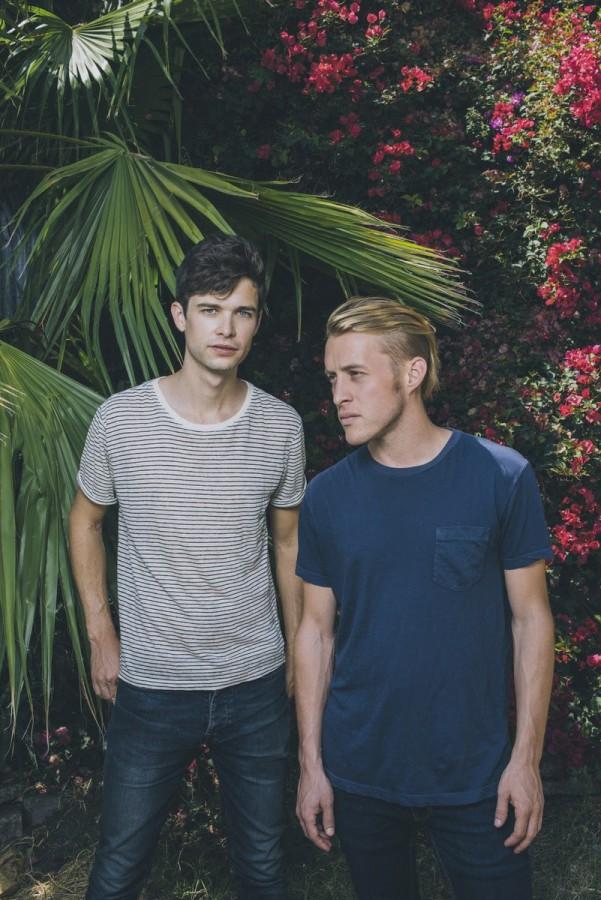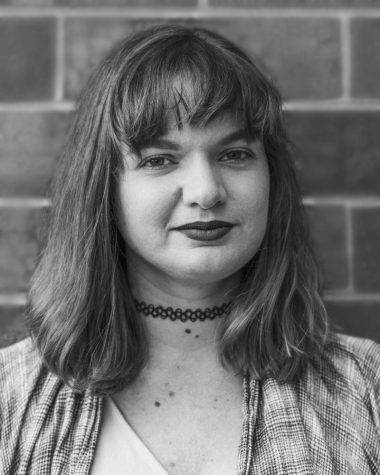Catching Up With Coast Modern
Coast Modern photographed on July 6, 2015 in Los Angeles, California.
March 4, 2016
Washington Square News recently got the opportunity to sit down with Coast Modern, a duo from Los Angeles that are just breaking into the L.A. music scene. Their music is commonly described as indie pop or synth hop, but incorporates many genres. Members Coleman Trapp and Luke Atlas got their start in the music industry writing songs for A-listers, but have recently broken off to form their own group. WSN visited the 300 Entertainment offices to ask them about their music, what their writing process is like and their thoughts on streaming in the digital age of music.
WSN: Would you say you write your songs to elicit a reaction in your listeners, or more to document an idea in your own heads?
Luke Atlas: It’s definitely about what we’re going through in the moment. We get together before writing and talk about what we’ve learned for the past week. We do a lot of reading and exploring, so it’s just getting our ideas out.
Coleman Trapp: Yeah, I’d say that I’d hope that listeners would be able to connect. I think we’re coming from a place of what’s really bubbling up, but you always hope that it connects.
LA: It has to be meaningful to us first before we think about it being meaningful to someone else.
WSN: When you’re recording, who gives you the best advice musically — fellow musicians, producers…?
LA: We do a lot of it ourselves, in my bedroom at home, actually. Like a bedroom home studio area, so we play all the music and record everything. But we have a lot of friends that are very musical and good at mixing that we’ve learned a lot from.
CT: You have to get input. If we’re stumped on something, people we trust musically that we see eye-to-eye with, different mentors, family members, fans — really anything to get that input.
WSN: Now that you’ve, as you say, “shut your brains off” and started writing these fantastic songs like “Hollow Life,” are you specifically going to write more songs in that style, or is each song more its own beast to be born?
CT: “Hollow Life” came so organically. We weren’t looking for a style for that one. It was like, we got on a computer and made a beat, and it had so much energy, and the words in “Hollow Life” were actually what we were feeling at the time, so they just flowed out. So I feel like if we were trying to do something like “Hollow Life” in the future, we wouldn’t come out with anything that was visceral. If there was any kind of formula, it would be taking a moment and being like, “What do we want to make? What are we feeling today?” And it could be a totally chilled out track or something angsty.
LA: Yeah, you have to get out what wants to come out. You can’t force it too much; you have to follow the song, really. It’s kind of floating out there and you just have to grab it. That’s what it feels like.
WSN: If you were a music critic reviewing your own work, what genre would you want to list yourselves as?
CT: I kind of like indie pop, to a degree. I think it’s got a poppy sound, but we weren’t going for that. That’s the indie part. Whatever we do, and the fact that it’s connecting to people – not necessarily that it’s pop music, but the fact that it is connecting, but we’re doing indie, so…
LA: Yeah, I mean… It really is just a very, very small little operation we’re running, so that seems right. I’m also cool with alternative, because I think it’s a little weird, and we’re just doing whatever we want, so it’s alternative to people that aren’t doing that.
WSN: What’s the best piece of advice you’ve got for other musicians who are trying not to sound like every other artist out there? After having written for other people, how do you write for yourself?
LA: I think it’s a really long process. You have to just get out the stuff that sounds like everyone else. You have to go through and make music that sounds like your favorite band, or for everyone else, and copy things so that you know how that works and you can get inside it.
CT: I think also trusting yourself is a big part of it. When you are taking that first step outside of stuff you’ve heard before or other things, there’s always that “are people going to like this, does it sound good,” and putting that to the side. And that’s a practice in itself; I don’t think that comes naturally. It took me a long time.
WSN: What was the best lesson that you learned writing songs for other musicians that you still use today?
CT: I still see myself writing for others in the future. A lot of it is… there’s not a right or wrong. A lot of people come into it like that, and are like “I’m writing with or for other people, and this is what you should do.” Especially if it’s another artist, giving space to let people explore.
LA: Letting someone — even if you kind of doubt someone’s idea that they throw out, seeing where it goes. Because sometimes you don’t know where it’s going to go initially. That’s huge. And that’s something that we’ve learned to do through working with other people and working together. There often times where there’s something that he throws out that I think is weird and not right, but then you follow where it goes, and then maybe throw in a little more after that, and it keeps morphing.
CT: I think as a general rule on that topic is not shooting down ideas in their infancy, but actually letting the idea grow and seeing where it goes, and giving it space, and then being like, “that was a bad idea.”
WSN: With everything that’s been going on in the industry lately about streaming — Kanye only putting TLOP on Tidal, Adele keeping 25 off of Spotify — what do you think is the smartest way for an artist to make music and make a profit? Will the fans have to sacrifice any listening habits they’ve already built up?
CT: I don’t think that the fans should have to do that. I think the key is accessibility. Making it where fans can find the music.
LA: I think it’s not so much thinking about the plays and the music as the product anymore. It’s like everything else around it can be the product, and a place for the artist to support themselves. The music is almost —
CT: It’s a catalyst, almost.
LA: Yeah, it’s the connector to people.
WSN: So you’re marketing a community.
CT: Kinda, yeah.
LA: Yeah, and it feels like that’s already starting, which is incredible to us. Because I think ultimately we just want to connect with other people and the music is the avenue to do that.
Email Hailey Nuthals at [email protected].
























































































































































